There are checklists to look at before investing in any PMS approaches. So here are the top 5 basic pointers to check:

Portfolio Management Services, PMS in short, is one of the options in alternative investments where professionals manage a client's investments. These include stocks, bonds, and commodities. PMS provides personalised or customised investment plans based on each client's risk appetite. This includes factors like the balance between debt and equity investments, overall risk-to-return profile, and most importantly, the investor's time horizon. The specific mix affects the potential returns, depending on the investor's risk tolerance.
Due to the minimum investment requirement of Rs 50 lakh, PMS is typically suited for high net-worth individuals (HNIs) and ultra-high-net-worth individuals (UHNIs). These services provide HNIs and UHNIs with a customised approach to wealth creation, considering their specific investment preferences.
While PMS investment strategies are regulated by the Securities and Exchange Board of India (SEBI), it is still important for investors to have a basic understanding of PMS products before investing.
Let’s start with:
Who is a portfolio manager?
A portfolio manager is a company that manages investments for clients. They can either give advice, direct instructions or handle everything themselves on behalf of the clients (investors) based on a contract signed with them. These investments can include stocks, bonds, or even other assets.
Types of PMS
Portfolio Management Services (PMS) offer a personalised approach to investing, allowing you to choose how much control you have over your investments. Based on this here are the three main types of PMS:
Discretionary: In this approach, the portfolio manager makes all the investment decisions and executes trades on your (investor’s) behalf.
Non-Discretionary: The portfolio manager recommends investment options, but you have the final say. You decide which trades to make based on fund management suggestions. So, here the funds are managed per the investors’ directions.
Advisory: Here, the portfolio manager acts as a guide, providing investment advice and insights. You make the investment decisions yourself, leveraging their expertise for informed choices.
Minimum requirement
The portfolio manager is required to accept a minimum of Rs 50 lakh or securities with a minimum worth of Rs 50 lakh from the client.
Partial withdrawal
PMS accounts offer flexibility for partial withdrawals, but there is a minimum investment (of Rs 50 lakh) threshold to maintain. However, the investment value in the portfolio after such withdrawal shall not be less than the applicable minimum investment amount (Rs 50 lakh). Note that there is no requirement to add more money (top-up) if the portfolio value dips below this minimum due to market fluctuations.
Once you understand the basic workings of the PMS products, here is the checklist of the top 5 things to keep in handy before you invest in a PMS.
Similar to mutual funds, PMS portfolios can be built using a variety of financial assets, including stocks, bonds, and commodities. Within the equities, PMS investments are categorised based on the size of the companies they invest in. This includes large cap, mid cap, small cap, thematic, sectoral and more.
For instance, large-cap PMS focuses on established, well-capitalised companies. Small and mid-cap PMS target smaller, growing companies with the potential for higher returns.
Similarly, thematic PMS invests in companies around specific trends or sectors, while sectoral PMS concentrate on a particular industry.
Depending on your investment requirements, one can choose investing strategy or products.
Portfolio managers charge fees for their services, and there are three main structures to consider: fixed fees, performance-sharing fees, and a hybrid combining both.
Fixed Fees: This is a straightforward approach where you pay a fixed percentage of your average portfolio value periodically, typically quarterly or monthly. This fee is charged regardless of how your portfolio performs. It's like a retainer for the manager's ongoing service.
Performance-Sharing Fees: Here, the fees are linked to your portfolio's performance. You only pay a fee if your portfolio outperforms a pre-defined hurdle rate. This hurdle rate is essentially the minimum acceptable return. So, let's say the hurdle rate is 8% and your portfolio generates a 10% return. You would only pay a performance fee on the 2% profit that exceeded the hurdle.
Hybrid Fees: This option combines both fixed and performance-sharing fees. You'll pay a fixed fee regardless of performance, along with a performance fee if your portfolio surpasses the hurdle rate.
PMS Bazaar has a detailed coverage on the PMS Fee Structure, and you can read it here: LINK
3. PMS taxation
When it comes to PMS taxation, especially equity PMS, you should understand that PMS investments are made in a Demat account under your name. This means that taxation is similar to equity investments. So, PMS investment attracts tax on capital gains. This means profits from the sale of securities within the PMS portfolio will be charged under short-term or long-term capital gains tax. Short-term capital gains (STCG) arise if the holding period of the asset is less than 1 year (12 months), and subject to tax at the applicable individual slab rate. Long-term capital gains (LTCG) occur when the holding period exceeds 1 year (12 months), and are taxed at 10% without indexation on equity-oriented funds exceeding Rs 1 lakh.
In the case of dividends received from PMS investments, the Dividend Distribution Tax (DDT) is applicable before the distribution of dividends by the PMS provider.
However, for investors, all details on taxation on the PMS portfolio will be made available. The AMCs are required to share audit report of all the transactions, of the PMS portfolio, during the financial year with the clients. This report will show the capital gains/losses for the year, the tax to be paid, and the DDT.
4. Can NRI invest in PMS?
Yes. Non-resident Indians can invest in PMS investment approaches in India. However, keep in mind that, you need to open a PIS (portfolio investment scheme) account before you invest. This apart, first you need to check whether PMSes (AMCs) accept investments from outside India, especially if you are from the US or Canada. While most PMSes accept NRI investments, there are a few that don't have the provision. In terms of taxation, it is similar for NRIs as resident individuals.
5. Information availability
Before diving into a Portfolio Management Service (PMS) investment, understanding the product and the Asset Management Company (AMC) offering it, is crucial. Here is where to look for information:
Data from PMS Bazaar
PMS Bazaar, a leading aggregator of PMS and Alternative Investment Funds (AIFs), offers comprehensive information. With respect to portfolio management service (PMS), it offers the following:
- Performance history: Detailed performance data for various timeframes, including 1 month, 3 months, 1 year, 3 years, all the way up to 10 years, and even since the product's inception, are available.
- AUM: Data on the total AUM of AMCs and specific PMS strategies are available.
- Client base: Number of clients with an AMC
- Portfolio composition: Details on the stock or financial asset holdings of a PMS approach, including specific stocks, sectors, and the fund manager's profile are available on the platform.
- Investment strategy: You can understand the core philosophy and approach guiding a PMS approach.
- Benchmark comparisons: See how the PMS performs compared to a benchmark index.
- Peer comparisons: You can also evaluate how the PMS stacks up against other PMS offerings.
- Performance visualisation: Get a clear picture of the PMS's performance through graphical representations for calendar and financial years.
- Portfolio breakdown: You can see details on which category the PMS invests whether it is small-cap, mid-cap or large-cap. You can also get details like average market cap, portfolio age, and top holdings (stocks and sectors).
- Investment flexibility: Check if the PMS allows for Systematic Investment Plans (SIPs) or Systematic Transfer Plans (STPs).
- Fee structure and exit load: Details on the charges by the PMSes are available on the platform.
- Minimum investment: While the minimum investment amount is Rs 50 lakh, a few AMCs set their own minimum investment requirement over and above Rs 50 lakh.
By leveraging these resources, you can make informed decisions when selecting a PMS investment approach that aligns with your risk tolerance.
Recent Blogs

January Rout, Extreme Dispersion: PMS Returns Swing From Losses to Gains
Benchmark falls deepened losses, but multi-asset and debt cushioned portfolios meaningfully
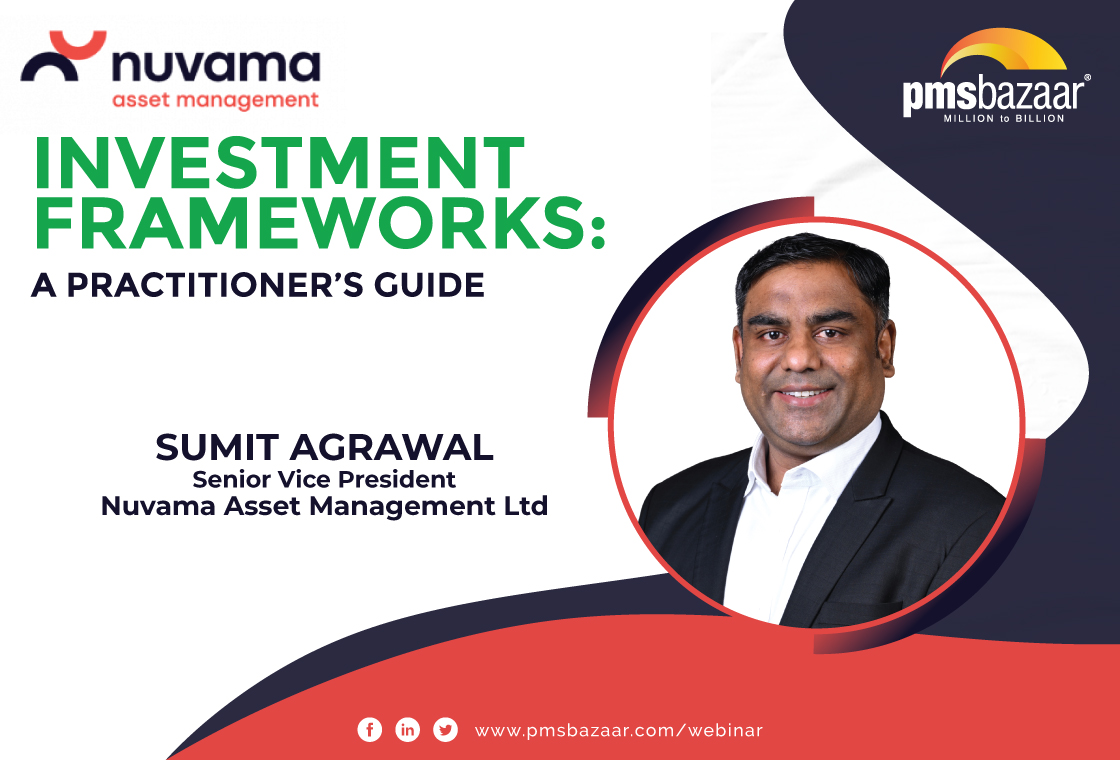
Investment Frameworks : A Practitioner’s Guide
PMS Bazaar recently organized a webinar titled “Investment Frameworks: A Practitioner’s Guide,” which featured Mr. Sumit Agrawal, Senior Vice President, Nuvama Asset Management Limited. This blog covers the important points shared in this insightful webinar.
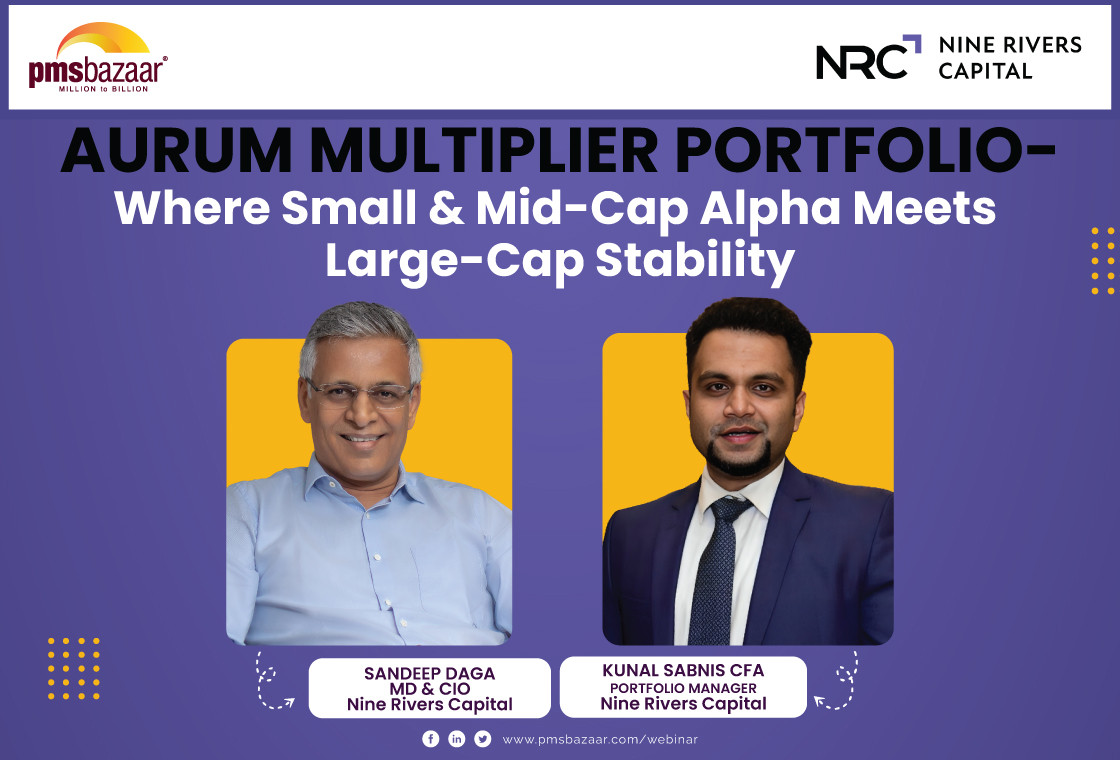
Aurum Multiplier Portfolio - Where Small and Mid-Cap Alpha Meets Large-Cap Stability
PMS Bazaar recently organized a webinar titled “Aurum Multiplier Portfolio - Where Small and Mid-Cap Alpha Meets Large-Cap Stability,” which featured Mr. Sandeep Daga, MD& CIO, Nine Rivers Capital and Mr. Kunal Sabnis, Portfolio Manager, Nine Rivers Capital. This blog covers the important points shared in this insightful webinar.
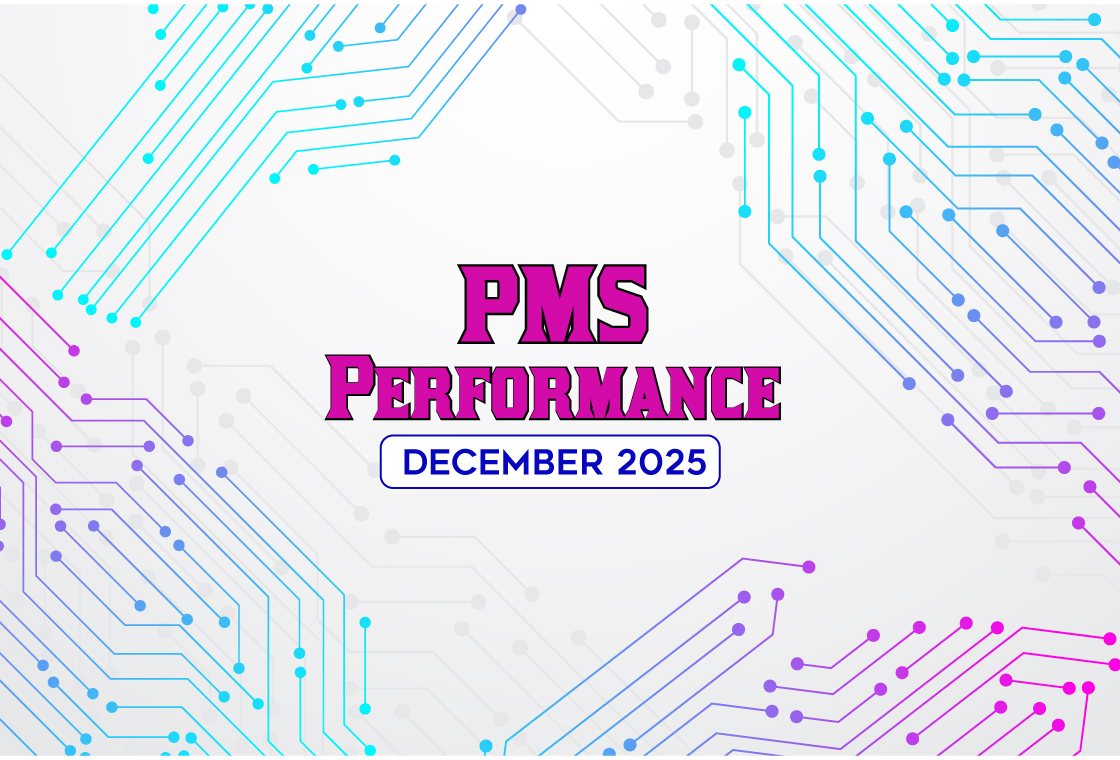
Flat Markets, Wide Outcomes: How 484 PMS Strategies Performed in Dec 2025
December 2025 was a month where market returns stayed close to flat, with the Nifty 50 TRI at -0.28% and the BSE 500 TRI at -0.24%.
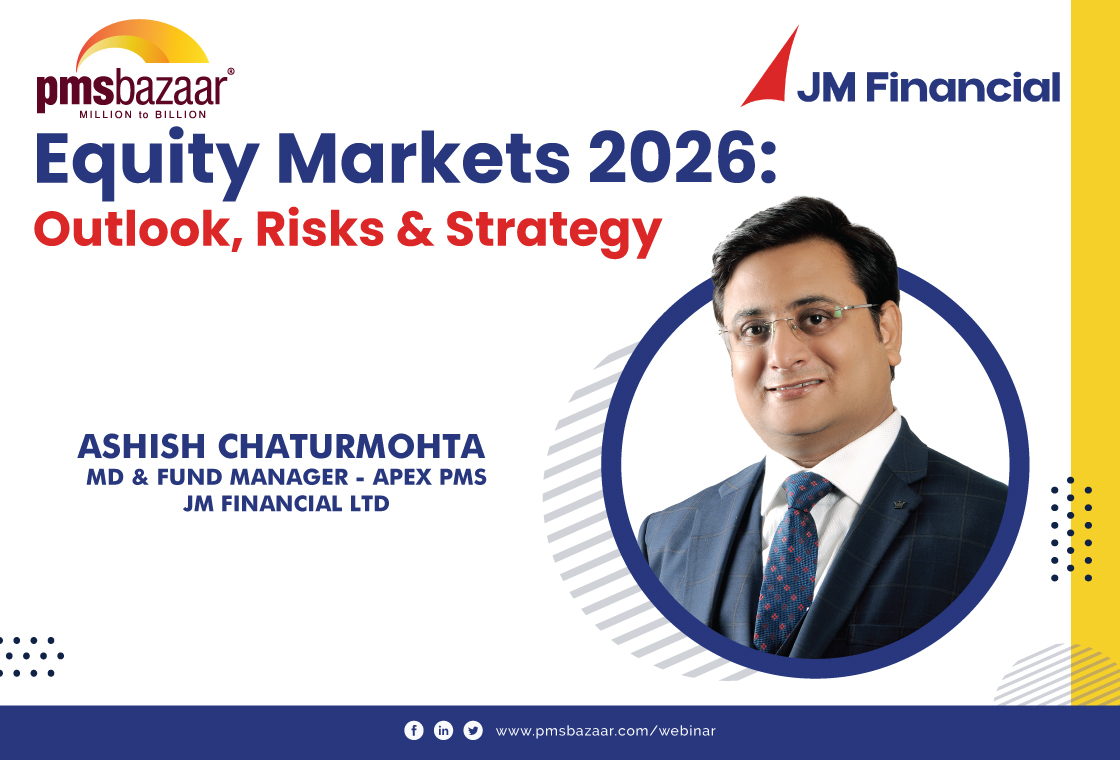
Equity Markets 2026: Outlook, Risks and Strategy
PMS Bazaar recently organized a webinar titled “Equity Markets 2026: Outlook, Risks and Strategy,” which featured Mr. Ashish Chaturmohta, MD & Fund Manager – APEX PMS, JM Financial Limited. This blog covers the important points shared in this insightful webinar.

MICRO CAPS: The Dark Horses of the Indian Equity Market
PMS Bazaar recently organized a webinar titled “MICRO CAPS: The Dark Horses of the Indian Equity Market,” which featured Mr. Rishi Agarwal and Mr. Adheesh Kabra, both Co-Founders and Fund Managers, Aarth AIF. This blog covers the important points shared in this insightful webinar.
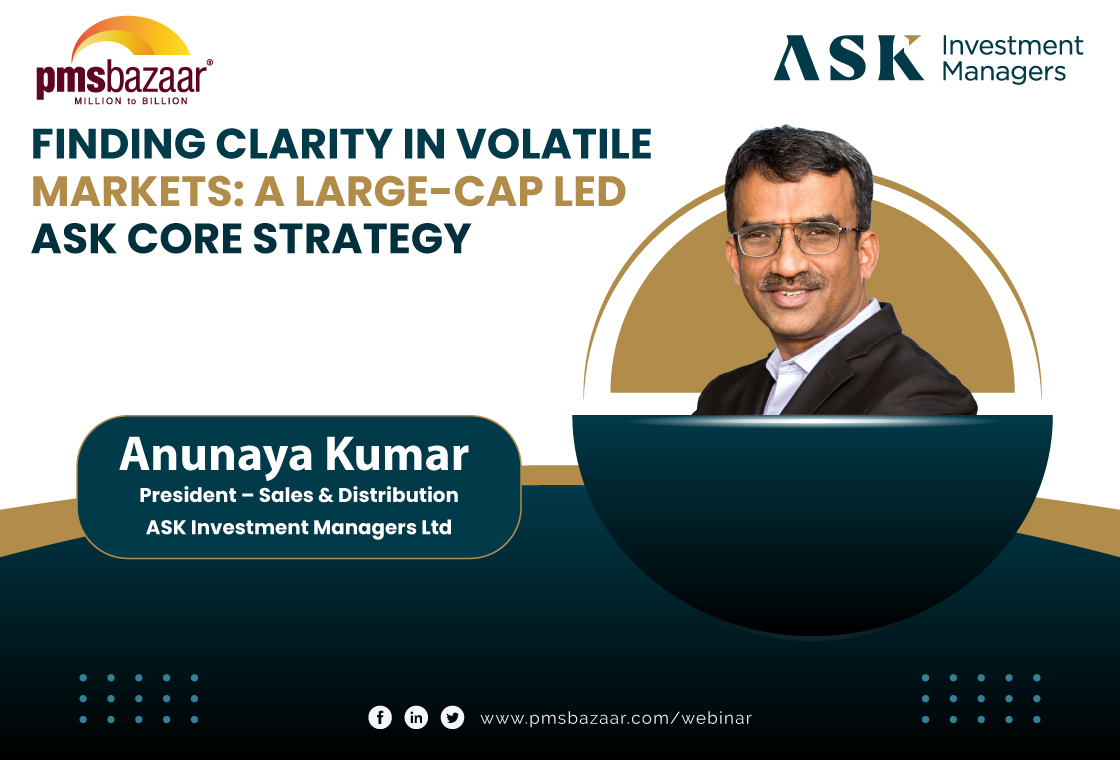
Finding Clarity in Volatile Markets: A Large-Cap Led ASK CORE Strategy
PMS Bazaar recently organized a webinar titled “Finding Clarity in Volatile Markets: A Large-Cap Led ASK CORE Strategy,” which featured Mr.Anunaya Kumar, President – Sales and Distribution ASK Investment Managers Limited. This blog covers the important points shared in this insightful webinar.
.jpg)
Passively Active Investing — A Modern Investor’s Lens on ETF-Based PMS
PMS Bazaar recently organized a webinar titled “Passively Active Investing — A Modern Investor’s Lens on ETF-Based PMS,” which featured Mr. Karan Bhatia, Co-Founder and Co-Fund Manager , Pricebridge Honeycomb ETF PMs. This blog covers the important points shared in this insightful webinar.

